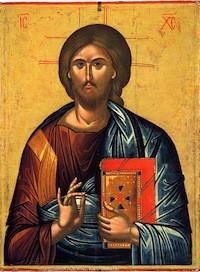15th Sunday - Challenged in Grace
A good poem is not necessarily about the rhymes, but how we listen to it, and it gets inside and changes our reality.
A good poem on the surface appears one way, but when we go deeper, beyond the surface words, we are challenged as to think differently, become more aware; and even to act differently.
Our liturgy actually contains lots of poetry; theological language using imagery and constructs, phrasing, to get our defenses down, so that the Spirit can mess with us.
Makes mass all the more enticing, eh? Try actually listening, or reading to the prayers.
Our second reading today also is a poem, probably was a song sung by the early Christians.
On the surface, beautiful theology!
It is a great summary of our Christian faith.
We are created to be with God, Father, Son and Holy Spirit.
We all know this, right?
God intended us to be part of the divine family, this is the Will of God.
This is the Good News!
We do not have to earn it, buy it, or merit it.
Yet, that is the challenge! Are we going to let it change us?
Ever hear of the great Franciscan-Dominican battle about this Good news and Jesus’ role?
The Dominicans, with St. Thomas Aquinas, have their “O Happy Fault” belief.
“O Happy fault”, when we come to the Easter Vigil, is part of the great Exultet Hymn, written by Aquinas. https://youtu.be/WyEAsiDjFP4
Jesus came so as to remedy the Sin, the fault of Adam and Eve. In other words, because of human sinfulness, the Son of God came, so as to save us from our sinfulness.
Franciscans, like St. Bonaventure, believed the Son of God was going to come no matter what. The Sin of Adam and Eve did not merit of the coming of Jesus.
Jesus would have come anyway to save us, to make possible this divine adoption. This would be our salvation from sinfulness.
Now, we don’t have to pick sides, at least today.
But, it points to what can happen when we go deeper.
See these words from Ephesians are wonderful, beautiful, glorious.
Almost Cumbaya-esque! Or even “Barney-ese”: “I love you, you love me!”
However, when we go deeper, the power these words can begin to disturb our reality.
Back in the 1930’s, a German theologian coined the phrase “Cheap Grace”.
The essence is that God graces us, literally, in Jesus Christ, so that we can become fully the part of the divine family.
See, Grace has purpose.
We cheapen that grace when we do not let it do its work.
Cheap grace means, “God loves me, so I can do whatever I want, and I can still be with God.”
Cheap grace means, “as long as I do the bare minimum, I am still on the right path.”
Cheap Grace means there is no change in our lives.
We are created to be one with God.
Let me ask a question: Can God be any less than God?
The answer is no. If God were any less than God, then God would not be God. Follow?
SO, if we are to be one with God, if God wants us to be united with the Father, Son and Holy Spirit, WE must become and be AS GOD IS!
We must be raised up and transformed so to be as God.
Jesus Christ is the way, the Truth and the Life.
Jesus, the Son of God, reveals the nature of the Father, and the Son and the Holy Spirit, so that the grace we are given, we allow to change us.
Change us so that we can overcome the temptation of sinfulness, to be more as the Father, Son and Holy Spirit.
Grace changes us to be more self-giving.
So instead of insisting the whole world and all other people change to meet “my” needs, we change ourselves to meet the world.
Just as the Son of God gave of himself to become human, to die on the cross.
Grace changes us to be forgiving.
So instead of holding onto our anger, and being all passive and directly aggressive towards others, we can let go of that need to take vengeance and encounter life.
Just as the Father forgave us for executing the Son.
Grace changes us to see all persons, all human persons, the conceived in the womb, the very elderly and dying, those in our streets, those migrants, those who are different from us, changes us to see them as human persons who are also desired by God.
Grace changes us to love, in other words.
Grace changes that bread and wine into the very body and blood of Christ, given out to us, to change us into the very body and blood of Christ.
To go out into the world, to spread the Good News, go out and be those self-giving, forgiving, loving persons that we are, because God created us to be.
If we choose not to allow ourselves to be changed, if we choose to reject who we are, in other words, sin; we refuse a very precious gift, we cheapen a great gift.
How disturbed are we? How challenged are we? Enough?








Thank you for sharing this here, since you won't be at the Sunday 5 pm this week.
ReplyDelete